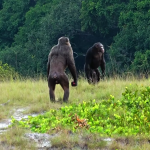Climate change could be about to impact a British institution – by changing the taste of a cup of tea, research has warned.
Extreme weather and rising temperatures could affect both the amount of land available for growing tea and the climate needed to produce the leaves that are turned into black tea, a report from Christian Aid has said.
Latest updates on climate change from the UK and around the world
The UK and Ireland drink more tea per person than any other countries in the world, with Kenya alone producing half the black tea drunk in the UK.
But Kenya, the world’s biggest exporter of black tea, faces more erratic rainfall, making floods and droughts more common, and rising temperatures, Christian Aid has said.
The charity’s report predicts optimal conditions for tea production in the East African country will fall by more than a quarter (26%) by 2050.
In areas with only average growing conditions, production will drop off by almost two-fifths (39%).
Other major tea-producing countries including India, Sri Lanka, and China, the world’s largest producer whose green tea is growing in popularity in the UK, also face rising temperatures and new weather extremes, the report said.
Not only is the amount produced under threat, so is the taste. The report says more rain means inferior quality leaves, and a lowering of the compounds that make the brew beneficial to health.
:: Subscribe to ClimateCast on Spotify, Apple Podcasts, Spreaker
Richard Koskei, 72, a tea farmer from Kericho in Kenya’s Western Highlands, said climate change is a “real threat”.
“We cannot predict seasons anymore, temperatures are rising, rainfall is more erratic, more often accompanied by unusual hailstones and longer droughts which was not the case in the past,” he said.
“If this continues then it will make growing tea much harder and life for us extremely difficult.”
He added: “Farmers like us are bearing the brunt of this crisis but we aren’t the ones that have caused it.”
Fiachra Moloney, of PG Tips maker Unilever, added: “In East Africa, where so much of our tea comes from, climate change is putting the livelihoods of the people who grow tea for us at risk.”
Under the international Paris Agreement, countries have committed to action to try to limit global warming to 1.5C above pre-industrial levels – because beyond that level, climate impacts will become increasingly severe.
US President Joe Biden’s Earth Day summit last month saw world leaders reaffirm their commitment to the climate, and the issue will be a focus of next month’s G7 meeting and a dedicated event later in the year.
Please use Chrome browser for a more accessible video player
Dr Kat Kramer, Christian Aid’s climate policy lead, said: “As host of both the G7 in June and the COP26 climate summit in November, the UK can ensure that countries on the front line of this crisis can adapt and respond to the impacts of climate change.
“With countries starting to announce improved climate plans, there is a unique opportunity to accelerate cuts in emissions.”
Sky News has launched the first daily prime time news show dedicated to climate change.
The Daily Climate Show is broadcast at 6.30pm and 9.30pm Monday to Friday on Sky News, the Sky News website and app, on YouTube and Twitter.
Hosted by Anna Jones, it will follow Sky News correspondents as they investigate how global warming is changing our landscape and how we all live our lives.
The show will also highlight solutions to the crisis and show how small changes can make a big difference.






















